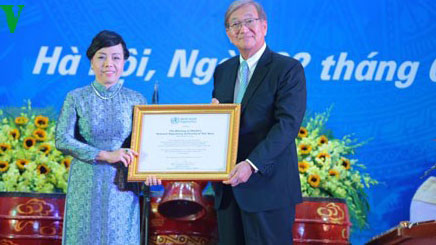VN certified to produce vaccines for the world
VGP - The World Health Organisation (WHO) has formally certified Viet Nam’s fully-equipped national regulatory system.
June 23, 2015 3:29 PM GMT+7
 |
Vaccines are made from inactivated or weakened germs, such as viruses and bacteria. They help develop the body's immunity against these diseases.
Successful immunization programmes depend on having safe and effective vaccines. For this reason, countries set up regulatory systems to ensure the quality, safety and efficacy of vaccines. WHO provides technical support to strengthen these regulatory systems.
Viet Nam brings the number of vaccine-producing countries in the Western Pacific Region to five that have met the WHO global criteria for quality oversight of vaccine production.
Regional Director of the WHO’s Western Pacific Region Shin Young-soo commended Viet Nam’s national regulatory system and the resulting safe and effective vaccines.
The certification is a great achievement for regulators and the Vietnamese people as confirmation that the quality of vaccines in Viet Nam meets international standards of production, safety and effectiveness, he said.
Viet Nam locally produces 10 out of the 12 vaccines used in the national vaccination programme, which provides vaccinations for 1.7 million newborns annually.
Since the first WHO assessment in 2001, the Government of Viet Nam has worked long and hard to become the 37th country in the world to be certified as having a functional regulatory system for vaccines.
By Vien Nhu
